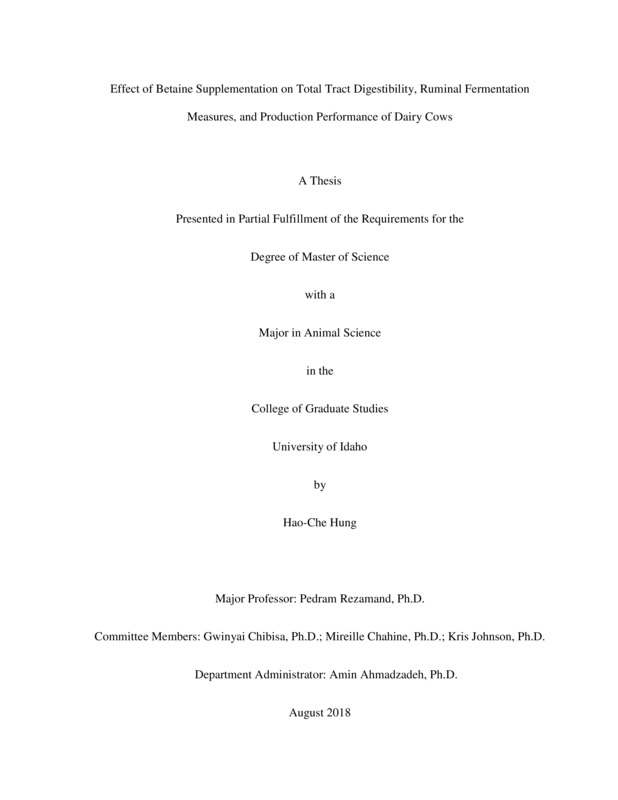Effect of Betaine Supplementation on Total Tract Digestibility, Ruminal Fermentation Measures, and Production Performance of Dairy Cows
Hung, Hao-Che. (2018-08). Effect of Betaine Supplementation on Total Tract Digestibility, Ruminal Fermentation Measures, and Production Performance of Dairy Cows. Theses and Dissertations Collection, University of Idaho Library Digital Collections. https://www.lib.uidaho.edu/digital/etd/items/hung_idaho_0089n_11458.html
- Title:
- Effect of Betaine Supplementation on Total Tract Digestibility, Ruminal Fermentation Measures, and Production Performance of Dairy Cows
- Author:
- Hung, Hao-Che
- Date:
- 2018-08
- Keywords:
- betaine digestibility production performance rumen fermentation measures
- Program:
- Animal and Veterinary Science
- Subject Category:
- Animal sciences
- Abstract:
-
Betaine, also called trimethylglycine, is either produced endogenously by choline oxidation or found naturally in wheat or sugar beets. We hypothesized that betaine supplementation improves the total tract digestibility, production performance, and changes the rumen fermentation measures in mid-lactation dairy cows. In experiment I, there were twenty mid-lactation dairy cows assigned to a 3 × 3 Latin square design with three periods of 28 d each and three treatments of betaine (0, 100, and 200 g/d). Milk yield and feed intake for each cow was recorded daily. During d 21-28, cows were fed with chromic oxide (15 g/d per cow). On d 26-28, fecal samples were collected and analyzed for digestibility via chromic oxide concentration analysis by inductively coupled plasma – atomic emission spectrometry (ICP-AES). Milk samples were collected on d 21 and d 28 for components analysis and fatty acids profile via gas chromatography. In experiment II, three rumen-cannulated Holstein dairy cows were used in a 3 × 3 Latin square design with three periods, 8 d each (1 d for in situ bags introduction and rumen fluid collection, 7 d wash-out), and three treatments of betaine at 0, 100, and 200 g placed into Dacron bags and double sealed. Rumen fluid was collected, and large mesh bags containing Dacron bags were introduced into the rumen at different time points (0, 1, 1.5, 2, 3, 6, 12, and 24 h). At each time point, three bags of 100 g and three bags of 200 g betaine were prepared. Dry and organic matter degradation was determined on dried, post in situ sample bags. Rumen fluid samples from different time-points were analyzed for volatile fatty acid profile using gas chromatography. Data were analyzed using the Proc Mixed of SAS with significance declared at P ≤ 0.05 and trends at P < 0.1. In experiment I, the apparent total tract digestibility tended to increase by supplementing 100 g betaine as compared with that with no dietary betaine (0.61 vs 0.58 ± 0.01; P = 0.1). Milk fat percent (3.16 vs 3.36 ± 0.08%, for 0 g betaine/d and 200 g betaine/d, respectively) and C20:1 (0.005 vs 0.004 ± 0.0006%, for 100 g betaine/d and 200 g betaine/d, respectively) tended to differ among treatments (P = 0.1 for both). Results showed however that DMI (25.4, 25.4, 25.4 ± 0.11 kg/d), milk yield (29.7, 29.3, and 30.0 ± 0.7 kg/d), and energy-corrected milk yield (28.5, 28.1, and 29.0 ± 0.8 kg/d) did not differ among treatments (0, 100, and 200g betaine/d per cow, respectively). In experiment II, there were increases in the ratio of acetate to propionate with betaine supplementation (1.7, 1.9, and 1.8 ± 0.03, for 0, 100, and 200 g betaine, respectively; P < 0.0001) and molar proportion of isovalerate with betaine supplementation (P < 0.005). Significant decreases in pH (6.4, 6.3, and 6.2 for 0, 100, and 200 g betaine, respectively) and molar proportion of propionate, butyrate, and isobutyrate with betaine supplementation were observed (P < 0.001 for all). There were no detectable changes in the molar proportion of acetate (0.42, 0.43, and 0.42 ± 0.006) or valerate (0.05, 0.04, and 0.05 ± 0.005). Overall, the result showed that betaine supplementation slightly affected the total tract digestibility and milk fat of mid-lactation dairy cows whereas no major effect was observed in production measures tested. Furthermore, changes in volatile fatty acid profile observed suggest the possibility of an effect of betaine supplementation on rumen microbial populations, which warrants further investigation.
- Description:
- masters, M.S., Animal and Veterinary Science -- University of Idaho - College of Graduate Studies, 2018-08
- Major Professor:
- Rezamand, Pedram
- Committee:
- Chibisa, Gwinyai; Chahine, Mireille; Johnson, Kris
- Defense Date:
- 2018-08
- Identifier:
- Hung_idaho_0089N_11458
- Type:
- Text
- Format Original:
- Format:
- application/pdf
- Rights:
- In Copyright - Educational Use Permitted. For more information, please contact University of Idaho Library Special Collections and Archives Department at libspec@uidaho.edu.
- Standardized Rights:
- http://rightsstatements.org/vocab/InC-EDU/1.0/

